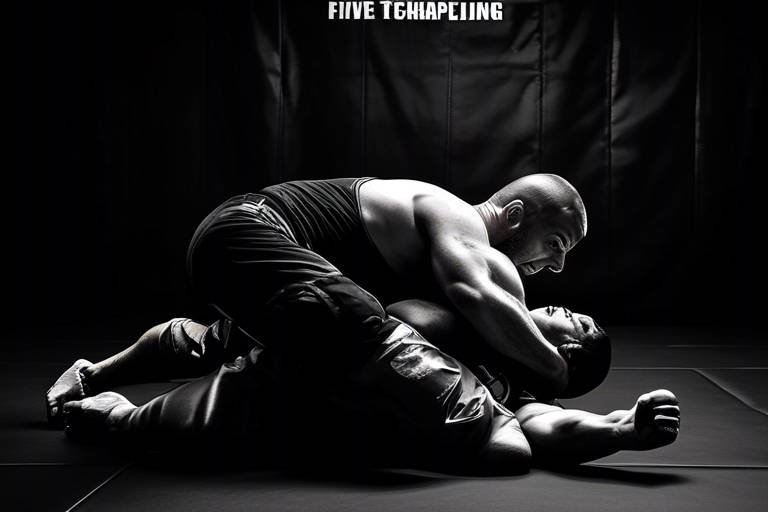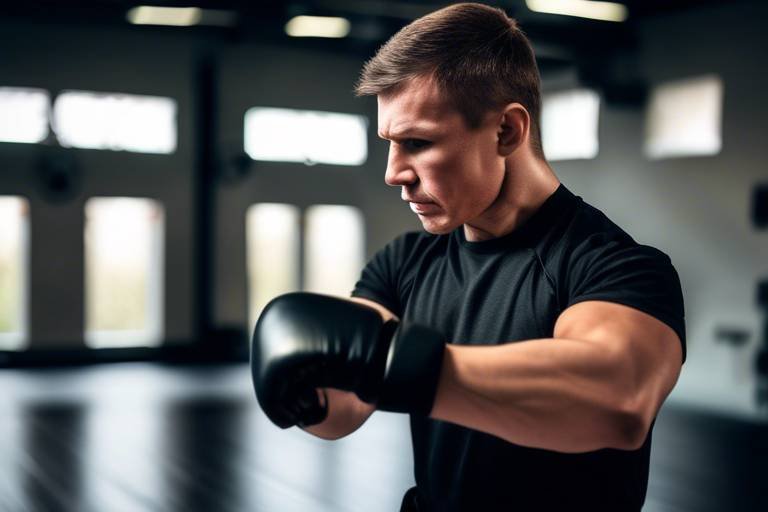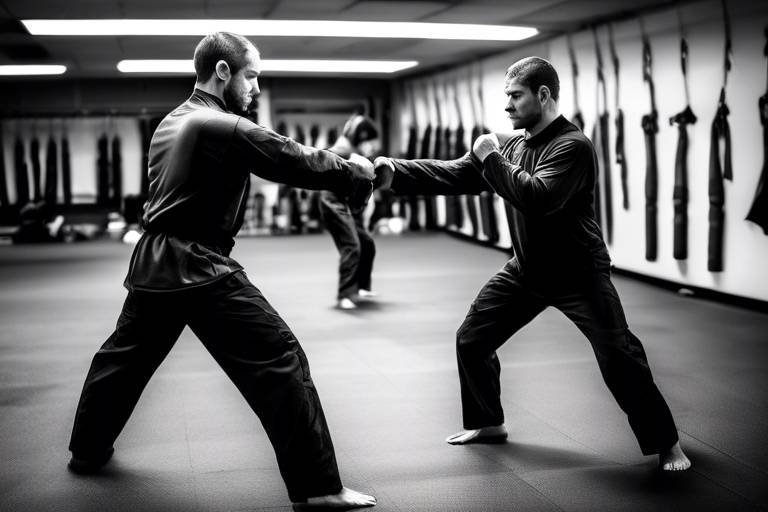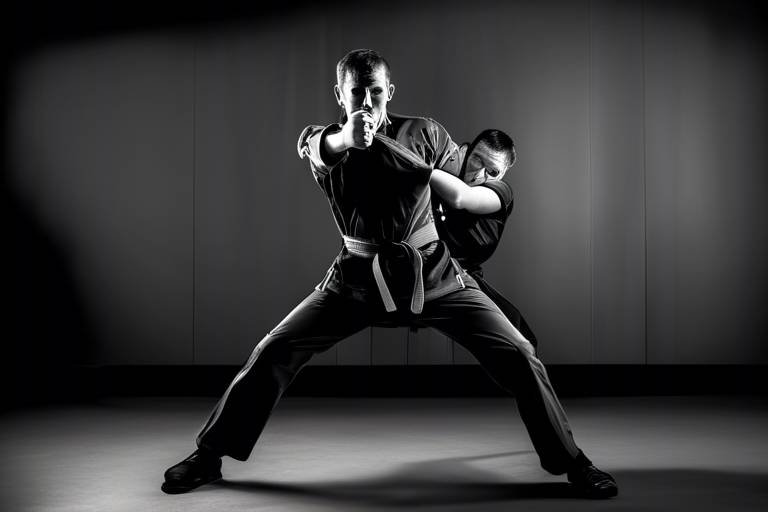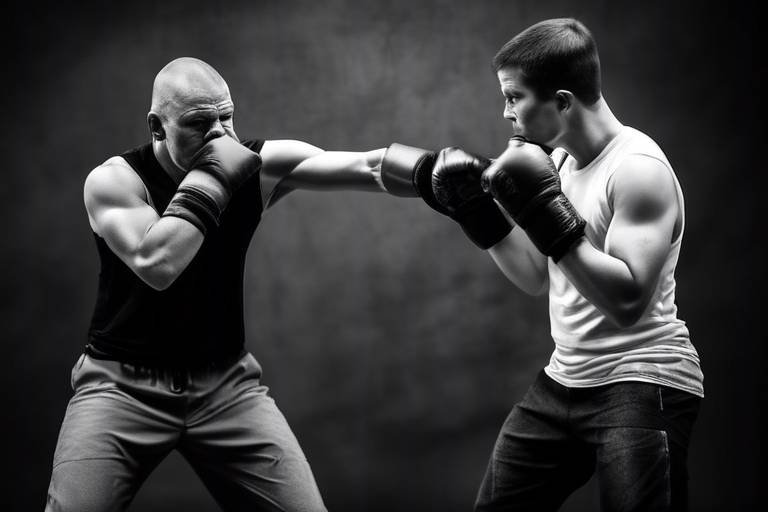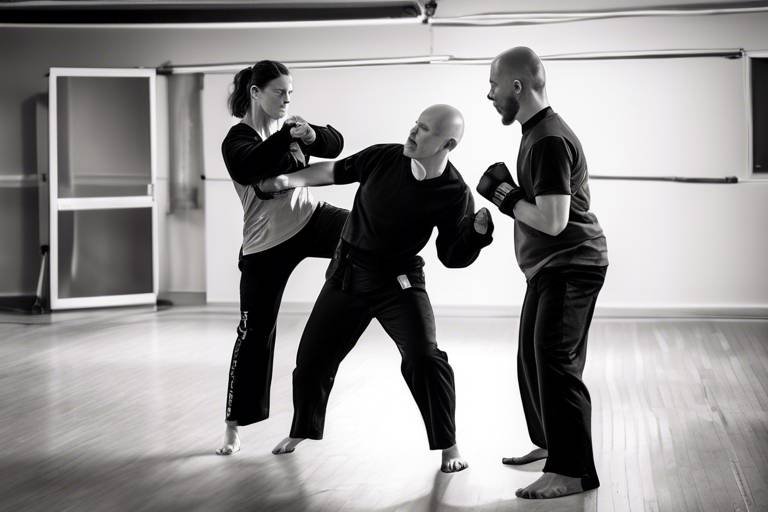Using Voice as a Powerful Self-Defense Technique
In a world where personal safety is a growing concern, many individuals often overlook one of the most powerful tools at their disposal: their voice. It's fascinating to think that the very instrument we use to express our thoughts and feelings can also serve as a formidable weapon in self-defense situations. Using voice as a self-defense technique goes beyond simply shouting for help; it involves mastering vocal techniques that can assert authority, convey urgency, and even dissuade potential threats. Imagine walking down a dimly lit street, and you suddenly feel uneasy. Instead of panicking, what if you could project a voice so strong and confident that it commands attention and respect? This article explores how vocal techniques can empower individuals in self-defense situations, highlighting various methods and strategies to enhance personal safety through the effective use of voice.
Understanding the significance of vocal empowerment in self-defense can help individuals gain confidence and assertiveness, making it a crucial aspect of personal safety and protection. Think about it: when you speak with conviction, people listen. Your voice can be a deterrent, a call for help, or a means to establish boundaries. By harnessing the power of your voice, you can transform from a passive bystander into an active participant in your own safety. This empowerment can lead to a profound change in how you navigate the world, allowing you to engage with confidence and assert your presence. When you feel confident in your ability to use your voice effectively, you not only enhance your personal safety but also contribute to a safer community.
Learning specific vocal techniques can enhance the strength and clarity of your voice, enabling you to communicate assertively and deter potential threats effectively. It's not just about volume; it's about clarity, tone, and presence. A well-developed voice can make your words resonate, leaving a lasting impact on those who hear you. Here are a few techniques to consider:
- Breathing Exercises: These are essential for voice control and projection. The more control you have over your breath, the more powerful your voice will be.
- Vocal Warm-Ups: Just like any muscle, your vocal cords need to be warmed up to perform at their best. Regular warm-ups can enhance clarity and resonance.
- Manipulating Tone and Pitch: Your tone can convey authority and urgency. Learning to adjust your pitch can help communicate your intentions effectively.
Breathing exercises play a vital role in voice control, helping individuals project their voices confidently and maintain composure during stressful situations. By focusing on your breath, you can calm your nerves and prepare to use your voice effectively. One of the most effective methods is diaphragmatic breathing, which not only enhances lung capacity but also improves voice projection. This technique allows you to speak with authority and confidence when needed, making it an invaluable skill in self-defense scenarios.
Diaphragmatic breathing involves breathing deeply from your diaphragm rather than your chest. This method increases oxygen intake and supports a stronger voice. To practice, find a comfortable position, place one hand on your chest and the other on your stomach, and inhale deeply through your nose, ensuring your stomach rises while your chest remains still. This technique can be a game-changer in high-stress situations, allowing you to remain calm and assertive.
Incorporating vocal warm-ups into your routine can improve clarity and resonance, ensuring your voice is prepared for any self-defense scenario. Simple exercises like humming, lip trills, and scales can enhance your vocal range and strength. Think of your voice as an instrument; just as a musician tunes their instrument before a performance, you should warm up your voice before stepping out into the world.
Manipulating tone and pitch can significantly impact how your voice is perceived. A low, steady tone can convey authority, while a higher pitch might express urgency. By practicing different tones and pitches, you can learn to convey your message more effectively. Imagine you're in a situation where you need to assert your boundaries; a firm, low tone can make it clear that you mean business, while a higher tone can signal distress and prompt others to help.
Assertiveness training focuses on using voice as a tool for self-expression, helping individuals communicate their needs and boundaries clearly and confidently. This training is essential for anyone looking to enhance their self-defense skills. Engaging in role-playing scenarios can provide practical experience in using voice assertively, preparing individuals for real-life situations where self-defense may be necessary. Additionally, receiving constructive feedback on vocal techniques can facilitate improvement, enabling individuals to refine their skills and enhance their self-defense capabilities.
Exploring real-life applications of vocal self-defense demonstrates its effectiveness, showcasing how individuals have successfully used their voices to deter threats and enhance personal safety. Analyzing case studies where vocal techniques were employed can provide valuable insights into the practical benefits of using voice as a self-defense tool. Moreover, participating in community workshops focused on vocal self-defense can foster skills development and promote awareness, empowering individuals to take charge of their personal safety.
There are numerous instances where individuals have successfully used their voices to defuse potentially dangerous situations. By examining these case studies, we can learn effective strategies and techniques that can be applied in our own lives. For example, a woman who confidently shouted "Back off!" in a threatening situation was able to deter an aggressor, illustrating the power of a strong voice. These real-life examples serve as powerful reminders of the impact that vocal assertiveness can have on personal safety.
Participating in community workshops focused on vocal self-defense can foster skills development and promote awareness, empowering individuals to take charge of their personal safety. These workshops often provide hands-on training, allowing participants to practice vocal techniques in a supportive environment. By learning from experienced instructors and engaging with others, individuals can build confidence in their vocal abilities and apply these skills in real-world situations.
Q: Can anyone learn to use their voice effectively for self-defense?
A: Absolutely! With practice and the right techniques, anyone can enhance their vocal skills for self-defense.
Q: How long does it take to see improvements in my voice?
A: Improvement varies by individual, but consistent practice can lead to noticeable changes within a few weeks.
Q: Are there specific exercises I can do at home?
A: Yes, breathing exercises, vocal warm-ups, and tone modulation practices can all be done at home.

The Importance of Vocal Empowerment
Vocal empowerment is more than just having a loud voice; it's about confidence, presence, and the ability to communicate effectively. In self-defense situations, the way you use your voice can be a game changer. Imagine being in a tense moment where your heart is racing, and you need to assert yourself. If you can harness the power of your voice, you can not only express your needs but also deter potential threats. This is why understanding the significance of vocal empowerment is crucial for personal safety.
When we talk about vocal empowerment, we're diving into a realm that combines psychology and physicality. A strong, assertive voice can make you appear more confident and in control. Think of it like this: if you were a lion in the wild, your roar would command respect and deter challengers. Similarly, your voice can serve as your personal roar, helping you establish boundaries and assert your presence.
Moreover, vocal empowerment extends beyond just self-defense. It plays a vital role in everyday interactions, enhancing your ability to communicate effectively in various situations. Whether you're negotiating a deal, standing up for yourself, or simply expressing your opinions, a strong voice can elevate your message. Here are some key reasons why vocal empowerment is essential:
- Builds Confidence: A powerful voice instills a sense of confidence that can be felt by both the speaker and the listener.
- Enhances Communication: Clear and assertive communication reduces misunderstandings and helps convey your message effectively.
- Deters Threats: An assertive voice can intimidate potential aggressors, making them think twice before approaching you.
- Establishes Authority: Speaking with conviction can position you as a leader in various scenarios, whether in personal or professional settings.
In essence, vocal empowerment is a fundamental aspect of self-defense that should not be overlooked. By developing a strong voice, you are not only preparing yourself for potential threats but also enhancing your overall communication skills. This dual benefit makes vocal empowerment an invaluable tool in both self-defense and everyday life.

Techniques for Developing a Strong Voice
When it comes to self-defense, having a strong voice can be just as crucial as physical skills. It's not just about shouting; it's about communicating assertively and effectively. Developing a strong voice involves a mix of techniques that enhance your vocal presence and confidence. Imagine your voice as a tool in your self-defense arsenal, ready to be wielded with precision when needed. By focusing on specific vocal techniques, you can ensure that your voice commands attention and respect, which can deter potential threats.
One of the foundational aspects of developing a strong voice is mastering your breathing. Breathing exercises are essential because they help control your breath, allowing you to project your voice more powerfully. For instance, practicing diaphragmatic breathing can significantly increase your lung capacity, enabling you to speak with authority. Instead of shallow breaths that can make your voice sound weak and shaky, diaphragmatic breathing encourages deep, controlled inhalations that support a stronger vocal output.
Breathing exercises are not just for singers or actors; they are vital for anyone looking to enhance their vocal strength. Here are some effective breathing techniques:
- Diaphragmatic Breathing: Lie down with a book on your stomach. As you breathe in, aim to raise the book by expanding your diaphragm. This exercise helps you learn to breathe deeply and efficiently.
- Controlled Exhalation: Take a deep breath and exhale slowly while counting to ten. This will help you gain control over your breath and improve your voice projection.
In addition to breathing, vocal warm-ups are crucial for preparing your voice for any situation. Just like athletes warm up their muscles before a game, warming up your vocal cords can improve clarity and resonance. Simple exercises like humming or lip trills can help loosen your vocal cords and prepare them for use. This preparation ensures that when you need to assert yourself, your voice is ready to deliver a clear and confident message.
Incorporating vocal warm-ups into your daily routine doesn’t have to be time-consuming. Here are a couple of quick warm-up exercises:
- Humming: Start with a gentle hum, gradually increasing the pitch. This helps in relaxing your vocal cords.
- Lip Trills: Make a “brrrr” sound with your lips while varying your pitch. This exercise helps with breath control and vocal range.
Another important aspect of developing a strong voice is understanding how to manipulate tone and pitch. The way you say something can often be more impactful than the words themselves. A commanding tone can convey authority, while a higher pitch might suggest uncertainty. By practicing variations in your tone and pitch, you can learn to express urgency or calmness as the situation demands. This skill can be particularly useful in self-defense scenarios where your voice needs to be both assertive and clear.
Ultimately, developing a strong voice is about practice and awareness. The more you engage in these techniques, the more natural they will become. Just like any other skill, your vocal strength will improve with consistent effort. So, take the time to invest in your voice—it could be a game changer in critical moments when you need to defend yourself.

Breathing Exercises for Voice Control
Have you ever noticed how a deep breath can change your entire demeanor? Breathing exercises are not just for yoga classes or meditation sessions; they are essential tools for anyone looking to gain control over their voice. When it comes to self-defense, having a strong and confident voice can be your best ally. It can make the difference between being heard and being ignored, between standing your ground and retreating in fear. By mastering your breath, you can project authority and composure, even in the most stressful situations.
One of the most effective techniques is diaphragmatic breathing, which involves using your diaphragm rather than your chest to breathe. This method not only increases your lung capacity but also helps you deliver your voice with more power and clarity. To practice diaphragmatic breathing, follow these steps:
- Find a comfortable position, either sitting or lying down.
- Place one hand on your chest and the other on your abdomen.
- Inhale deeply through your nose, ensuring that your abdomen rises while your chest remains still.
- Exhale slowly through your mouth, feeling your abdomen fall.
- Repeat this process for several minutes, focusing on the rise and fall of your abdomen.
Incorporating vocal warm-ups into your routine is another fantastic way to prepare your voice for any situation. These exercises can enhance your vocal clarity and resonance, ensuring that your voice is not only strong but also clear. Simple warm-ups like humming or lip trills can help you loosen up your vocal cords and improve your overall vocal quality.
But why stop there? Consider integrating some fun and engaging exercises into your practice. For instance, try reading aloud from your favorite book or reciting a poem. This not only strengthens your vocal muscles but also helps you get comfortable with speaking assertively. Remember, the goal is to become familiar with the sound of your own voice and to feel confident using it.
In summary, mastering breathing exercises is a powerful way to enhance your voice control. By focusing on your breath and incorporating various vocal warm-ups, you can develop a strong, assertive voice that can serve you well in self-defense situations. So, take a moment to breathe deeply and let your voice resonate with confidence!

Diaphragmatic Breathing
When it comes to enhancing your voice for self-defense, is a game changer. This technique is not just about taking a deep breath; it’s about harnessing the full power of your lungs to project your voice with authority and confidence. Imagine being in a high-pressure situation where your voice needs to carry over noise or assert your presence. Diaphragmatic breathing allows you to do just that. By using your diaphragm, you can fill your lungs more completely, which leads to a stronger, more resonant voice.
To practice diaphragmatic breathing, start by finding a comfortable position, either sitting or lying down. Place one hand on your chest and the other on your abdomen. As you inhale deeply through your nose, focus on expanding your abdomen rather than your chest. This means your stomach should rise as you breathe in, while your chest remains relatively still. Exhale slowly through your mouth, feeling your abdomen fall. Try to make your exhalation longer than your inhalation. This not only improves your voice but also helps you feel more relaxed and centered, especially in stressful situations.
Here’s a simple breakdown of the benefits of diaphragmatic breathing:
| Benefit | Description |
|---|---|
| Improved Voice Projection | Allows for a stronger, clearer voice that can be heard over distance or noise. |
| Increased Relaxation | Helps reduce anxiety and tension, making it easier to communicate effectively. |
| Enhanced Lung Capacity | Strengthens respiratory muscles, allowing for longer and more controlled breaths. |
Incorporating this technique into your daily routine can significantly enhance your vocal strength and clarity. It’s not just about sounding good; it’s about feeling empowered. When you can control your breath, you control your voice, and that is a powerful tool in any self-defense scenario. So next time you're preparing for a challenging day or anticipating a stressful situation, take a moment to practice diaphragmatic breathing. You might be surprised at how much more confident you feel when you speak!

Vocal Warm-Ups
Vocal warm-ups are not just for singers; they are a crucial component for anyone looking to enhance their vocal presence, especially in self-defense scenarios. Just like athletes stretch their muscles before a game to prevent injury and improve performance, warming up your voice prepares it for the demands of assertive communication. Imagine your voice as a finely tuned instrument; without proper preparation, it can sound strained or weak, which is the last thing you want when trying to project authority in a tense situation.
Engaging in vocal warm-ups can significantly improve your clarity, resonance, and overall vocal strength. These exercises help to loosen the vocal cords and improve airflow, making it easier to speak with confidence and power. Here are a few effective warm-up techniques that anyone can incorporate into their daily routine:
- Humming: Start by gently humming at a comfortable pitch. This helps to warm up your vocal cords and get the blood flowing.
- Lip Trills: Blow air through closed lips while making a sound. This exercise relaxes the lips and engages the diaphragm, essential for voice projection.
- Sirens: Glide your voice from a low pitch to a high pitch and back down again, like a siren. This exercise helps to stretch your vocal range and improve flexibility.
- Vowel Sounds: Practice singing or speaking the vowels (A, E, I, O, U) in various pitches. This strengthens your vocal cords and enhances clarity.
Incorporating these warm-ups into your daily routine can be as simple as spending five to ten minutes each morning or before a crucial meeting. Just think of it as a warm-up for your voice, much like how athletes prepare their bodies for physical exertion. The more you practice, the more natural and effective these techniques will become.
Furthermore, vocal warm-ups are not only beneficial for enhancing voice quality but also play a significant role in boosting your confidence. When you know your voice is strong and clear, you are more likely to express yourself assertively. This confidence can be a game-changer in self-defense situations, where the ability to communicate effectively can deter potential threats.
So, next time you find yourself needing to assert your presence, remember the power of vocal warm-ups. They are a simple yet effective way to prepare your voice for any challenge that lies ahead.
Q: How long should I spend on vocal warm-ups?
A: Ideally, spend about 5-10 minutes daily on vocal warm-ups to effectively prepare your voice.
Q: Can vocal warm-ups help with anxiety in public speaking?
A: Yes! Vocal warm-ups can increase your confidence and reduce anxiety by ensuring your voice is ready to perform.
Q: Are there specific warm-ups for different vocal ranges?
A: Absolutely! Tailor your warm-ups to your vocal range, focusing on exercises that suit your specific needs.
Q: Do I need any special equipment for vocal warm-ups?
A: No special equipment is needed; just your voice and a quiet space to practice.

Using Tone and Pitch Effectively
When it comes to self-defense, the words you say are just as important as how you say them. Using tone and pitch effectively can transform your voice into a powerful tool that not only communicates your message but also commands respect and attention. Think of your voice as an instrument; just like a musician adjusts their sound to fit the mood of the piece, you can modify your vocal qualities to convey authority, urgency, or calmness depending on the situation.
Imagine walking down a dimly lit alley and sensing that someone is following you. In that moment, your voice can be your first line of defense. A deep, steady tone can project confidence, while a higher pitch might convey fear or uncertainty. By consciously controlling your tone, you can create an impression that you are not someone to be trifled with. This is crucial because potential threats often look for signs of vulnerability. If you sound unsure, you may inadvertently invite trouble.
Moreover, pitch plays a vital role in how your voice is perceived. A lower pitch often suggests authority and confidence, making it less likely for an aggressor to disregard your presence. Conversely, a higher pitch can signal distress, which might escalate a threatening situation. Therefore, practicing how to modulate your pitch can be a game-changer in self-defense scenarios. For instance, if you find yourself in a confrontation, using a firm, low pitch can help you assert your boundaries effectively.
To help you understand the impact of tone and pitch, consider the following table that outlines different vocal qualities and their potential effects:
| Vocal Quality | Effect |
|---|---|
| Deep Tone | Conveys authority and confidence |
| High Pitch | Can indicate fear or distress |
| Calm Tone | Reassures and defuses tension |
| Urgent Tone | Commands immediate attention |
In addition to pitch and tone, the pace at which you speak can also influence how your message is received. Speaking too quickly might suggest anxiety, while a slower pace can give the impression of control and thoughtfulness. This is particularly important in self-defense situations where clear communication can make all the difference. For example, if you need to shout for help, a loud, steady voice will carry much further than a frantic scream.
Ultimately, mastering the art of using tone and pitch effectively requires practice. Consider engaging in vocal exercises that focus on these elements. You might even find it beneficial to record yourself speaking in different tones and pitches, then play it back to assess how you sound. This self-evaluation helps you become more aware of your vocal strengths and areas for improvement, making you better prepared for any situation.
So, the next time you think about self-defense, remember that your voice is a formidable ally. By harnessing the power of tone and pitch, you can not only protect yourself but also project confidence and assertiveness, deterring potential threats before they even arise.
- How can I practice using my voice for self-defense? Regular vocal exercises, role-playing scenarios, and recording yourself can help improve your vocal skills.
- What should I do if I feel threatened? Use a strong, steady voice to assert your boundaries and seek help if needed.
- Can tone and pitch really deter an attacker? Yes, a confident tone and deep pitch can project authority, making you less likely to be targeted.

Assertiveness Training through Voice
When it comes to self-defense, many people immediately think of physical techniques, but what about the power of your voice? is a game-changer in this arena. It empowers individuals to express themselves clearly and confidently, which can be just as crucial as any physical defense move. Imagine walking down a dimly lit street, and you sense someone is following you. Instead of panicking, you take a deep breath, square your shoulders, and let out a firm, commanding, “Stop!” That’s the essence of vocal assertiveness—using your voice as a shield.
Assertiveness training focuses on teaching individuals how to communicate their needs and boundaries effectively. It’s about more than just volume; it’s about clarity, tone, and the message you convey. The right vocal techniques can transform a hesitant whisper into a powerful declaration. When you speak with authority, you send a clear signal that you mean business, and potential threats are more likely to back off.
Engaging in role-playing scenarios is a fantastic way to practice these skills. Imagine a workshop where you and your peers simulate various situations—perhaps you’re at a bus stop, and someone is invading your personal space. You practice saying, “Please step back, you’re too close,” with conviction. This kind of practice not only builds confidence but also helps you develop an instinctive response for real-life situations. Each time you rehearse, you’re conditioning your mind and body to react assertively when it matters most.
Feedback is another critical component of assertiveness training. After role-playing, receiving constructive criticism from peers or instructors can help refine your vocal techniques. You might discover that your pitch is too high when you’re nervous, or that you tend to mumble when you feel threatened. By addressing these issues, you can enhance your vocal presence, making your voice a powerful tool for self-defense.
In addition to role-playing and feedback, many workshops incorporate vocal exercises that focus on breath control and projection. These exercises help ensure that your voice can carry over distances and be heard above background noise. When you’re in a stressful situation, it’s easy to forget to breathe deeply, but practicing these techniques regularly can make a world of difference. You’ll find that when the moment arises, your voice will be strong and steady, ready to assert your boundaries.
Ultimately, assertiveness training through voice is about empowerment. It’s about taking control of your narrative and ensuring that your voice is heard. The more you practice, the more natural it becomes to use your voice as a means of self-defense. You’re not just learning to speak; you’re learning to command respect and assert your presence in a world that can sometimes feel overwhelming.
In conclusion, the journey to vocal assertiveness is not just about learning to shout louder; it’s about finding your voice and using it effectively. Whether through role-playing, receiving feedback, or engaging in vocal exercises, each step you take builds your confidence and enhances your ability to protect yourself. So, the next time you think about self-defense, remember the power of your voice—it might just be your best ally.
- What is assertiveness training? Assertiveness training is a method that teaches individuals how to express their needs and boundaries clearly and confidently.
- How can my voice help in self-defense? A strong, confident voice can deter potential threats and assert your boundaries effectively.
- What techniques can I use to improve my vocal assertiveness? Techniques include role-playing scenarios, vocal exercises, and receiving constructive feedback.
- Can I practice assertiveness training alone? While you can practice vocal techniques by yourself, engaging in group workshops or role-playing with others can provide valuable feedback and experience.

Role-Playing Scenarios
Engaging in is an incredibly effective way to develop the vocal skills needed for self-defense. Imagine being in a situation where your safety is at risk; how would you react? Role-playing allows you to step into these hypothetical situations in a controlled environment, providing a safe space to practice your assertiveness and vocal techniques. It’s like a dress rehearsal for real life, where you can experiment with different responses and discover what works best for you.
During these scenarios, participants can take on various roles, such as a potential aggressor or a bystander, while others practice their vocal responses. This not only helps in honing your vocal strength but also builds your confidence. You might find yourself saying, "Stop! Back away!" or even "Leave me alone!" in a commanding tone. The more you practice, the more natural these phrases will feel, and the more likely you are to use them effectively in a real situation.
Additionally, role-playing can incorporate different environments and contexts. For example, you could simulate a situation in a crowded subway or an empty parking lot. Each setting presents unique challenges and requires different vocal strategies. In a crowded space, you might need to project your voice over background noise, while in a quieter area, a firm but calm tone could suffice. This variety is crucial because it prepares you for the unpredictability of real-life scenarios.
Furthermore, one of the greatest benefits of role-playing is the opportunity for feedback and improvement. After each scenario, participants can discuss what worked well and what didn’t. This feedback loop is invaluable; it allows individuals to refine their approach and become more adept at using their voices as a self-defense tool. You might discover that a certain pitch or tone resonates better with others, or that a specific phrase has a stronger impact than you initially realized.
Incorporating role-playing into your self-defense training not only enhances your vocal skills but also fosters a sense of community. Participants often share their experiences and tips, creating a supportive environment where everyone can learn and grow. This camaraderie can boost your motivation and make the learning process enjoyable. So, why not gather a few friends or join a local workshop? You’ll be surprised at how empowering it feels to take control of your safety through the power of your voice.
- What is the purpose of role-playing in self-defense training? Role-playing helps individuals practice vocal techniques and assertiveness in realistic scenarios, enhancing their confidence and preparedness for real-life situations.
- Can role-playing be done alone? While it’s beneficial to practice with others, individuals can also role-play alone by speaking out loud in front of a mirror or recording their voice to analyze later.
- How often should I practice role-playing scenarios? Consistent practice is key. Aim for at least once a week, gradually increasing the complexity of the scenarios as you become more comfortable.
- Are there specific phrases I should focus on during role-playing? Yes! Phrases like "Stop!", "Leave me alone!", and "I need help!" are essential. Practicing these can help you respond quickly and assertively in a crisis.

Feedback and Improvement
When it comes to enhancing your vocal self-defense skills, feedback is an invaluable tool. Just like a musician perfects their craft through practice and critique, individuals can significantly improve their vocal techniques by seeking constructive criticism. This process not only boosts confidence but also sharpens the ability to communicate effectively during high-pressure situations. Have you ever noticed how a slight change in tone can alter the perception of a message? The same principle applies here. By understanding how your voice is perceived, you can adjust and refine your delivery to ensure it resonates with authority and urgency.
To truly harness the power of your voice, consider recording your practice sessions. Listening to your recordings can reveal nuances in your vocal delivery that you might not notice in real-time. Are you speaking too softly? Is your tone lacking conviction? Self-assessment is a crucial step in the improvement process. Additionally, sharing these recordings with trusted friends or mentors can provide fresh perspectives. They might point out strengths you weren't aware of or suggest areas for enhancement that could make all the difference in a self-defense scenario.
Moreover, participating in group workshops can create a dynamic environment for feedback. When practicing in a supportive group, you can engage in role-playing exercises where you simulate real-life situations. This allows for immediate feedback from peers, which can be incredibly beneficial. Imagine receiving instant advice on how to adjust your tone or volume while addressing a potential threat. This kind of practical experience is unmatched and can bolster your confidence immensely.
Ultimately, the journey of vocal improvement is ongoing. Embrace the process, remain open to learning, and don't shy away from feedback. Remember, even the most skilled communicators started somewhere. With each session, you'll find yourself becoming more adept at using your voice as a powerful tool for self-defense.
- How can I practice vocal techniques at home? You can practice by reading aloud, recording your voice, and experimenting with different tones and pitches. Consider using breathing exercises to help control your voice.
- What are some common mistakes to avoid when using voice for self-defense? Common mistakes include speaking too softly, using a hesitant tone, or failing to project confidence. It's crucial to practice assertiveness and clarity.
- Can vocal self-defense techniques be applied in everyday situations? Absolutely! Using your voice effectively can enhance communication in various scenarios, from asserting boundaries to negotiating conflicts.
- Are there professional trainers who specialize in vocal self-defense? Yes, many vocal coaches and self-defense instructors offer workshops focused on vocal empowerment. Look for local classes or online resources.

Real-Life Applications of Vocal Self-Defense
When it comes to personal safety, having a strong voice can be a game changer. Imagine being in a situation where you feel threatened; your first instinct might be to flee or freeze. However, what if you could use your voice as a powerful tool to assert your presence and deter potential threats? Vocal self-defense isn't just a concept; it's a practical skill that can be applied in various real-life scenarios. From everyday encounters to more serious confrontations, knowing how to effectively use your voice can provide a sense of empowerment and security.
Consider a crowded subway where someone begins to harass you. Instead of panicking, imagine taking a deep breath and projecting your voice with confidence. A clear, firm command like, "Stop right there!" can not only catch the attention of nearby passengers but also assert your boundaries. This is where vocal techniques come into play, transforming your voice into a shield against unwanted advances. In fact, many individuals have successfully navigated threatening situations by employing their vocal skills, proving that a strong voice can be just as effective as physical self-defense techniques.
To illustrate the effectiveness of vocal self-defense, let's take a look at some real-life case studies. One notable example involved a young woman who was approached by an aggressive stranger in a parking lot. Instead of succumbing to fear, she remembered her vocal training and shouted, "Help! Someone call the police!" Her loud, urgent voice not only drew attention but also startled the assailant, giving her the opportunity to escape. This incident highlights how vocal assertiveness can turn the tide in potentially dangerous situations.
Moreover, community workshops focused on vocal self-defense are becoming increasingly popular. These workshops not only teach individuals how to project their voices but also provide a safe space to practice these techniques through role-playing scenarios. Participants learn to navigate various situations, from confrontations with aggressive individuals to dealing with unwanted attention in social settings. The supportive environment fosters confidence and encourages participants to refine their vocal skills, ultimately empowering them to take charge of their personal safety.
In addition to workshops, many self-defense programs are now integrating vocal techniques into their curricula. By combining physical self-defense moves with vocal empowerment, individuals are equipped with a holistic approach to safety. This dual approach ensures that they can defend themselves physically while also using their voice to assertively communicate their needs and boundaries. The synergy between voice and physical defense creates a more comprehensive skill set, making individuals more prepared for whatever challenges they may face.
- What is vocal self-defense? Vocal self-defense refers to the use of voice techniques to assert oneself and deter potential threats in various situations.
- How can I improve my vocal skills for self-defense? Engaging in breathing exercises, vocal warm-ups, and assertiveness training can significantly enhance your vocal skills.
- Are there any workshops available for vocal self-defense? Yes, many communities offer workshops that focus on developing vocal techniques as a means of self-defense.
- Can using my voice really make a difference in a threatening situation? Absolutely! A strong, assertive voice can attract attention and deter aggressors, providing you with a crucial advantage.

Case Studies of Successful Interventions
When it comes to self-defense, the power of voice can be a game-changer. Numerous individuals have found themselves in threatening situations where their vocal techniques played a crucial role in diffusing the danger. Let's explore some compelling case studies that highlight the effectiveness of vocal self-defense.
One notable example is the story of a young woman named Sarah, who was walking home late one evening. She noticed a man following her, and as her heart raced, she remembered her training in vocal assertiveness. Instead of succumbing to fear, she turned around and shouted, "Leave me alone! I'm calling the police!" The sheer volume and authority in her voice startled the man, causing him to rethink his intentions and flee the scene. This incident emphasizes how a strong, confident voice can deter potential threats and empower individuals to take control of their safety.
Another inspiring case is that of a high school teacher, Mr. Thompson, who faced a disruptive situation in his classroom. A student began to act aggressively towards others, creating an atmosphere of fear. Instead of escalating the situation with anger or panic, Mr. Thompson utilized his voice to establish authority. He calmly but firmly addressed the student, saying, "I need you to stop right now and think about your actions. This behavior is not acceptable." His ability to project calmness and assertiveness not only de-escalated the situation but also reinforced the respect he commanded from his students. This instance illustrates that using your voice effectively can not only protect you but also help maintain a safe environment for others.
In a more community-focused scenario, a neighborhood watch group organized a self-defense workshop that included vocal training. Participants learned how to use their voices to assertively communicate during potential threats. One participant, Maria, shared her experience of using her vocal skills when she noticed suspicious activity in her neighborhood. Instead of remaining silent or retreating, she confidently approached the individuals and stated, "I see you. I’m reporting this to the authorities." Her assertive tone conveyed that she was not afraid and was actively watching out for her community. This proactive use of voice not only deterred the suspicious individuals but also empowered others in her neighborhood to be vigilant.
These case studies reveal a common thread: the ability to harness the power of one's voice can lead to successful interventions in potentially dangerous situations. By practicing vocal techniques and assertiveness, individuals can develop the confidence needed to speak up and protect themselves and others. It’s not just about the words spoken; it’s about how they are delivered that makes all the difference.
- How can I develop a stronger voice for self-defense?
Practicing breathing exercises, vocal warm-ups, and assertiveness training can significantly enhance your vocal strength and confidence. - What should I do if I feel threatened?
Trust your instincts and use your voice assertively. Shout for help or clearly state your boundaries to deter potential threats. - Are there community resources for vocal self-defense training?
Yes! Many communities offer workshops and classes focused on self-defense techniques, including vocal empowerment.

Community Workshops and Training
Community workshops and training sessions focused on vocal self-defense are invaluable resources for individuals seeking to enhance their personal safety. These workshops not only teach practical vocal techniques but also foster a sense of community and shared learning. Imagine stepping into a room filled with like-minded individuals, all eager to learn how to harness the power of their voices. The energy is palpable, and the atmosphere is charged with excitement and empowerment.
In these workshops, participants engage in various activities designed to develop their vocal skills. They practice breathing exercises, explore the nuances of tone and pitch, and participate in role-playing scenarios that simulate real-life situations where vocal assertiveness is crucial. This hands-on approach not only builds confidence but also allows individuals to experiment with their voices in a supportive environment. After all, practice makes perfect, and what better way to practice than among friends?
Moreover, community workshops often include feedback sessions, where participants can receive constructive criticism from peers and instructors. This feedback loop is essential for improvement, as it helps individuals identify their strengths and areas for growth. Picture yourself delivering a powerful statement in a simulated confrontation, only to receive insightful feedback that helps you refine your delivery for future scenarios. This iterative process of learning is what makes these workshops so effective.
Beyond the practical skills gained, these workshops also serve as a platform for building a network of supportive individuals. In a world where personal safety can feel daunting, having a community of people who share similar goals can be incredibly reassuring. Participants often leave these workshops not only with enhanced vocal skills but also with newfound friendships and support systems. The bonds formed in these sessions can lead to ongoing practice groups or even local advocacy for self-defense education in the community.
To give you a clearer idea of what these workshops might look like, here’s a brief overview:
| Workshop Component | Description |
|---|---|
| Breathing Techniques | Learn diaphragmatic breathing to enhance voice projection. |
| Vocal Exercises | Engage in warm-ups to improve clarity and resonance. |
| Role-Playing | Simulate real-life scenarios to practice assertive communication. |
| Feedback Sessions | Receive constructive feedback from peers and instructors. |
In conclusion, community workshops and training focused on vocal self-defense are not just about learning to shout louder; they are about empowering individuals to express themselves clearly and confidently. Whether you’re a seasoned communicator or someone who struggles to find their voice, these workshops provide the tools and support needed to transform your vocal presence. So, why not seek out a workshop in your area? You might just discover a newfound confidence that extends beyond self-defense, enhancing every aspect of your life!
- What can I expect from a vocal self-defense workshop? You can expect to learn various vocal techniques, engage in role-playing scenarios, and receive feedback to improve your skills.
- Are these workshops suitable for beginners? Absolutely! Workshops cater to all skill levels, and everyone is encouraged to participate regardless of their experience.
- How often should I practice the techniques learned? Regular practice is recommended to build confidence and skill. Even a few minutes a day can make a significant difference!
- Can vocal self-defense really deter threats? Yes! A strong, assertive voice can often dissuade potential aggressors and help you communicate your boundaries effectively.
Frequently Asked Questions
- What is vocal empowerment in self-defense?
Vocal empowerment in self-defense refers to the ability to use your voice effectively to assert yourself and deter potential threats. It involves techniques that enhance your vocal strength, clarity, and confidence, making your voice a powerful tool in personal safety situations.
- How can I develop a stronger voice for self-defense?
To develop a stronger voice, you can practice breathing exercises like diaphragmatic breathing, which increases lung capacity and projection. Additionally, incorporating vocal warm-ups into your routine can improve clarity and resonance, ensuring you’re prepared to communicate assertively when it matters most.
- Why are breathing exercises important for voice control?
Breathing exercises are crucial because they help you manage stress and maintain composure during tense situations. By controlling your breath, you can project your voice more effectively, making it sound more authoritative and confident, which is essential in self-defense scenarios.
- What role does tone and pitch play in vocal self-defense?
Tone and pitch significantly affect how your voice is perceived. A lower, steadier tone can convey authority, while a higher pitch might indicate fear. By manipulating these elements, you can communicate urgency and assertiveness, which can deter potential aggressors.
- How can assertiveness training help me in self-defense?
Assertiveness training focuses on expressing your needs and boundaries clearly. By learning to use your voice as a tool for self-expression, you can communicate more effectively in high-pressure situations, making it easier to stand your ground and protect yourself.
- What are role-playing scenarios, and how do they help?
Role-playing scenarios simulate real-life situations where you might need to use your voice assertively. Engaging in these exercises allows you to practice vocal techniques in a safe environment, building your confidence and preparing you for actual self-defense situations.
- Can feedback really improve my vocal self-defense skills?
Absolutely! Constructive feedback helps you identify areas for improvement and refine your vocal techniques. By receiving guidance from instructors or peers, you can enhance your skills, making your voice a more effective tool for self-defense.
- Are there real-life examples of vocal self-defense being effective?
Yes, there are numerous case studies where individuals have successfully used their voices to deter threats. These examples highlight the practical benefits of vocal techniques, showcasing how assertive communication can enhance personal safety in various situations.
- How can I participate in community workshops for vocal self-defense?
You can look for local self-defense classes or community centers that offer workshops focused on vocal self-defense. These workshops provide valuable training and skills development, empowering you to take charge of your personal safety.


